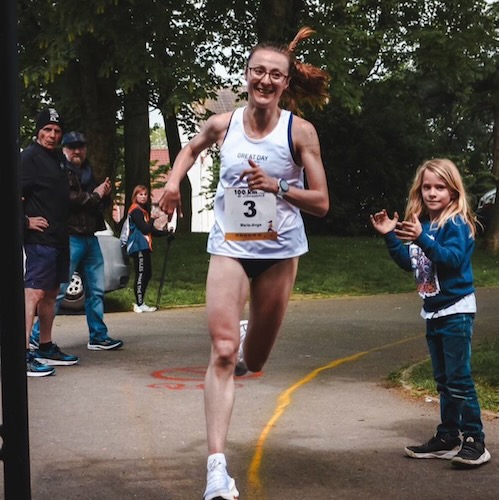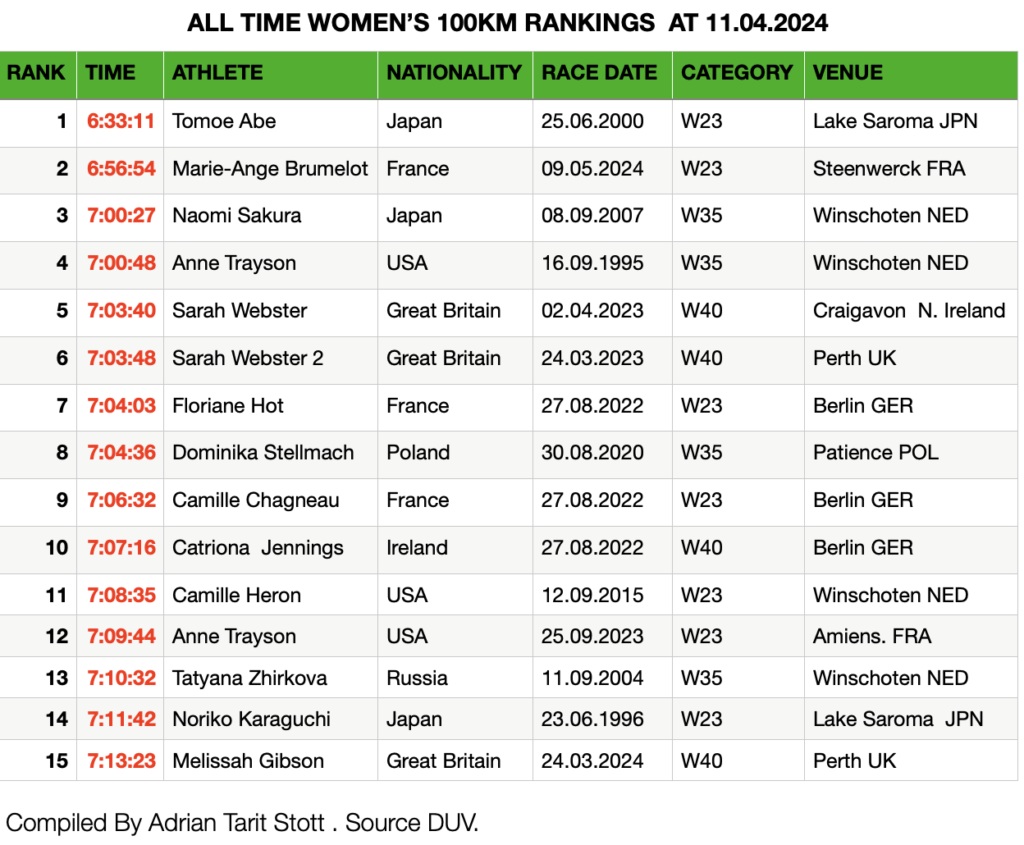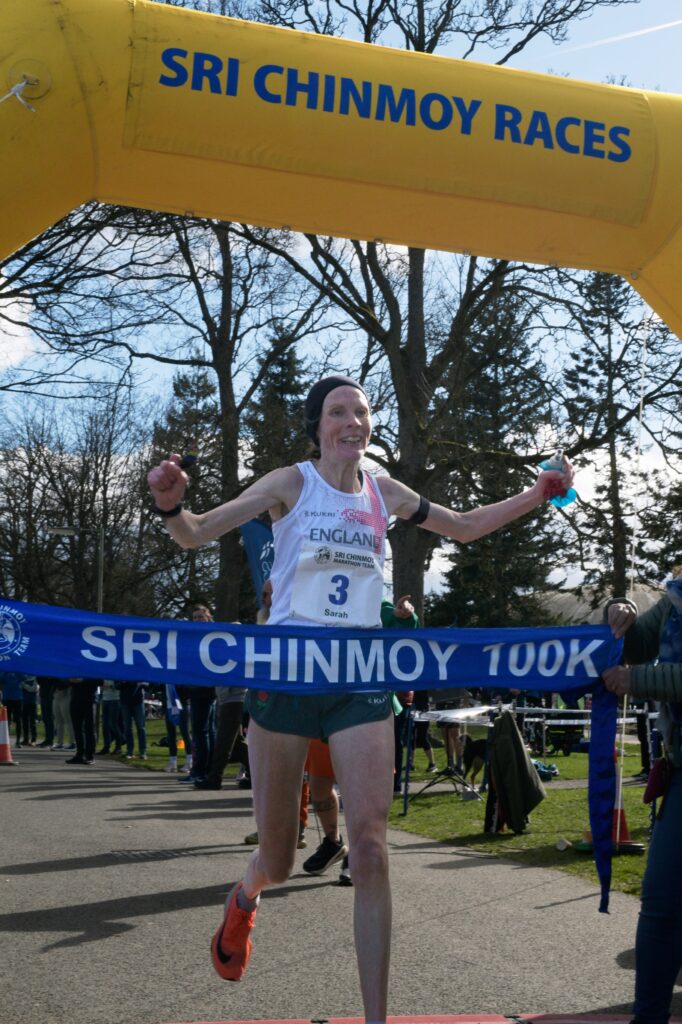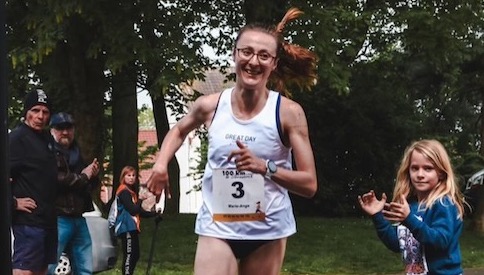The fastest-ever 100km time by a female European athlete may not be ratified.

The French Athlete Marie-Ange Brumelot has become the first female European Athlete to run a sub 7 hour 100km. She ran 6:56:54 at a race in Steenwerck, France, on the 9th of May to set a World lead for 2024. The time improves that set by Sarah Webster at the Sri Chinmoy 100km race in Perth on March 24th, where Webster ran 7:03:48 (still awaiting ratification).
It is also the second fastest time recorded by a woman, behind the current world record of Japan’s Tomoe Abe of 6:33:11, and improves the French national record from the time of 7:04:03 set by Florianne Hot at the IAU World championships in Berlin in August 2022. Until six weeks ago, this was the Official European 100km record.
Ratification of the record unlikely
However, due to what seems bureaucratic differences, the record will not be ratified. Details are still emerging, but it seems the French Athletic Federation, FFA, had withdrawn the race’s permit status. For any record to be ratified in any country, one important criteria is that the event must have a licence or permit from the national federation. 100km and 50k, are the two standard ultra distances, recognised for record purposes by World Athletics and by Area governing bodies, in this case, European Athletics.
The International Association of Ultrarunners, IAU, is involved with this process as it ratifies all ultra records at standard distances from 50km to 6 days, including age group records. The IAU have their own labelling system for races, but it seems, on this occasion, the event also did not have an IAU label.
According to a social media post from Brumelot, the Steenwerck race did not have an FFA or IAU label.
A statement from the organisers indicates there was an issue with additional levies collected for runners not affiliated with the French Federation. This appears to be a levy that race organisers in France collect, much like the “£2 unattached levy” in the UK.
“𝘛𝘩𝘪𝘴 𝘺𝘦𝘢𝘳, 𝘵𝘩𝘦 𝘦𝘷𝘦𝘯𝘵 𝘸𝘪𝘭𝘭 𝘯𝘰𝘵 𝘣𝘦𝘯𝘦𝘧𝘪𝘵 𝘧𝘳𝘰𝘮 𝘢𝘯𝘺 𝘭𝘢𝘣𝘦𝘭 𝘰𝘳 𝘢𝘳𝘣𝘪𝘵𝘳𝘢𝘵𝘪𝘰𝘯. 𝘛𝘩𝘶𝘴, 𝘰𝘶𝘳 𝘳𝘢𝘤𝘦𝘴 𝘸𝘪𝘭𝘭 𝘯𝘰𝘵 “𝘛𝘩𝘪𝘴 𝘺𝘦𝘢𝘳, 𝘵𝘩𝘦 𝘦𝘷𝘦𝘯𝘵 𝘸𝘪𝘭𝘭 𝘯𝘰𝘵 𝘣𝘦𝘯𝘦𝘧𝘪𝘵 𝘧𝘳𝘰𝘮 𝘢𝘯𝘺 𝘭𝘢𝘣𝘦𝘭 𝘰𝘳 𝘢𝘳𝘣𝘪𝘵𝘳𝘢𝘵𝘪𝘰𝘯. 𝘛𝘩𝘶𝘴, 𝘰𝘶𝘳 𝘳𝘢𝘤𝘦𝘴 𝘸𝘪𝘭𝘭 𝘨𝘪𝘷𝘦 𝘳𝘪𝘴𝘦 𝘵𝘰 𝘢𝘯𝘺 𝘳𝘦𝘧𝘦𝘳𝘦𝘯𝘤𝘦 𝘵𝘪𝘮𝘦𝘴 𝘧𝘰𝘳 𝘵𝘩𝘦 𝘥𝘪𝘧𝘧𝘦𝘳𝘦𝘯𝘵 𝘤𝘩𝘢𝘮𝘱𝘪𝘰𝘯𝘴𝘩𝘪𝘱𝘴. 𝘛𝘩𝘦 𝘳𝘦𝘢𝘴𝘰𝘯 𝘪𝘴 𝘢𝘴 𝘧𝘰𝘭𝘭𝘰𝘸𝘴: 𝘵𝘩𝘦 𝘍𝘳𝘦𝘯𝘤𝘩 𝘈𝘵𝘩𝘭𝘦𝘵𝘪𝘤𝘴 𝘍𝘦𝘥𝘦𝘳𝘢𝘵𝘪𝘰𝘯 𝘩𝘢𝘴 𝘥𝘦𝘮𝘢𝘯𝘥𝘦𝘥 𝘢 𝘳𝘪𝘨𝘩𝘵 𝘵𝘰 𝘳𝘦𝘷𝘪𝘦𝘸 𝘵𝘩𝘦 𝘳𝘦𝘨𝘪𝘴𝘵𝘳𝘢𝘵𝘪𝘰𝘯 𝘢𝘮𝘰𝘶𝘯𝘵, 𝘯𝘢𝘮𝘦𝘭𝘺 𝘵𝘩𝘦 𝘪𝘮𝘱𝘰𝘴𝘪𝘵𝘪𝘰𝘯 𝘰𝘧 𝘢𝘯 𝘪𝘯𝘤𝘳𝘦𝘢𝘴𝘦𝘥 𝘳𝘢𝘵𝘦 𝘧𝘰𝘳 𝘢𝘭𝘭 𝘢𝘵𝘩𝘭𝘦𝘵𝘦𝘴 𝘯𝘰𝘵 𝘭𝘪𝘤𝘦𝘯𝘴𝘦𝘥 𝘣𝘺 𝘵𝘩𝘦 𝘧𝘦𝘥𝘦𝘳𝘢𝘵𝘪𝘰𝘯.
𝘈𝘵 𝘵𝘩𝘦 100𝘬𝘮 𝘸𝘢𝘭𝘬 𝘪𝘯 𝘚𝘵𝘦𝘦𝘯𝘸𝘦𝘳𝘤𝘬, 𝘸𝘦 𝘳𝘦𝘧𝘶𝘴𝘦𝘥 𝘵𝘩𝘪𝘴 𝘤𝘰𝘯𝘥𝘪𝘵𝘪𝘰𝘯 𝘸𝘩𝘪𝘤𝘩 𝘳𝘦𝘴𝘶𝘭𝘵𝘦𝘥 𝘪𝘯 𝘵𝘩𝘦 𝘪𝘮𝘮𝘦𝘥𝘪𝘢𝘵𝘦 𝘭𝘰𝘴𝘴 𝘰𝘧 𝘰𝘶𝘳 𝘯𝘢𝘵𝘪𝘰𝘯𝘢𝘭 𝘭𝘢𝘣𝘦𝘭, 𝘵𝘩𝘦 𝘺𝘦𝘢𝘳 𝘧𝘰𝘭𝘭𝘰𝘸𝘪𝘯𝘨 𝘰𝘶𝘳 𝘴𝘶𝘤𝘤𝘦𝘴𝘴𝘧𝘶𝘭 𝘩𝘰𝘴𝘵𝘪𝘯𝘨 𝘰𝘧 𝘵𝘩𝘦 𝘍𝘳𝘦𝘯𝘤𝘩 𝘤𝘩𝘢𝘮𝘱𝘪𝘰𝘯𝘴𝘩𝘪𝘱𝘴 𝘪𝘯 𝘚𝘵𝘦𝘦𝘯𝘸𝘦𝘳𝘤𝘬.
𝘞𝘦 𝘳𝘦𝘮𝘪𝘯𝘥 𝘺𝘰𝘶 𝘵𝘩𝘢𝘵 𝘍𝘍𝘈 𝘳𝘶𝘯𝘯𝘦𝘳𝘴 𝘢𝘳𝘦 𝘸𝘦𝘭𝘤𝘰𝘮𝘦 𝘣𝘶𝘵 𝘸𝘦 𝘸𝘪𝘭𝘭 𝘯𝘰𝘵 𝘣𝘦 𝘢𝘣𝘭𝘦 𝘵𝘰 𝘢𝘭𝘭𝘰𝘸 𝘵𝘩𝘦𝘪𝘳 𝘱𝘦𝘳𝘧𝘰𝘳𝘮𝘢𝘯𝘤𝘦 𝘵𝘰 𝘣𝘦 𝘳𝘦𝘤𝘰𝘳𝘥𝘦𝘥 𝘰𝘯 𝘚𝘐𝘍𝘍𝘈.”
Bumelot is based in the United States, in New York, and has been a marathon specialist with a personal best of 2 hours 33 minutes and 9 seconds set in 2023 at Rotterdam. She is ranked 26th on the French women’s all-time Marathon list.
All Time Women’s 100km times at 12.05.2024

It was her first 100km race and looks like it might even be her first race beyond the marathon distance.
She was fourth overall in the Steenwerck event, which involved running three loops of approximately thirty-three kilometres. Her time equates to an average of 14.39 km/h. Reports indicate that she ran negative splits. The first 50km run in 3 hours 27 minutes, and the second half in 3 hours 29 minutes.
She commented on her Instagram account, “ Not too bad for a first. I set this goal after being a little frustrated with my recent preparations for the marathon. On paper, I thought it was doable and that I had the ability to run less than 7 hours. The training wasn’t perfect, but we succeeded.
Unfortunately, I only found out about it( the licensing issue) a week before the race. I would have liked the organisers to communicate this information much earlier. With so few 100 km road races available in the calendar, the Federation has agreed to take Steenwerck’s results into account for selection for the World Championships, but the European record will not be ratified.”
There are parallels with Sarah Webster’s situation.
Like Bremelot, she came into her first 100km race in April 2023, at Craigavon in Northern Ireland, a little under the radar. The event included the British Championship and the annual Anglo Celtic Plate, a home country’s international featuring teams from Ireland, Scotland, Wales, England, and Northern Ireland and Ulster.

Webster, with a marathon PB of 2:39:56, was expected to do well and possibly challenge 7 hours 30 minutes. She exceeded everyone’s expectations, not only breaking former world champion Carolyn Hunter-Rowe’s British record of 7:27:19, but bettering the then European record of 7:04:03. The Craigavon race was well organised, with the necessary federation and IAU labels, and a course measured by a qualified course measurer,
What they didn’t have in place at the event was drug testing, which although not necessary currently for a Great Britain 100km record, is necessary for a European record.
A year later, at Perth in Scotland, at the Sri Chinmoy 100km, which hosted the British Championship for 2024, Webster ran 7:03:48, 8 seconds slower than her British record from the previous year, but 18 seconds inside Florianne Hot’s existing European mark of 7:04:03.
Drug testing had been put in place by the organisers at Perth, and at the time of writing, the record forms are with the IAU records committee awaiting ratification. Their conclusions will then be shared with European Athletics.
Although we await any further details from the French Federation, Brumelot looks set to have to try again for the European record. If, as she states, she is still in line for selection by France for the World Championship 100km in Bengaluru, India, on 7th December, the heat and humidity of the venue may not be conducive to fast times.
The 100km landscape seems to have changed in the last few years, both for men and women. At the elite level, it has become an event that has attracted much interest from faster marathon runners wishing to move up in distance. If this trend continues, race organisers will have to be more proactive in understanding the needs of the athletes. Athletes too, when planning their races, will have to be more aware of these criteria and have that two-way conversation to ensure all is in place,
Potential opportunities for records do not come around too often in an athlete’s career.
Full results for the Steenwerck race are HERE
Read our chat with Sarah Webster after her Perth victory HERE
PLEASE SHARE!
Thanks for reading . If you have enjoyed this post, do see our other ones HERE
If you have a comment, please feel free to add it below.
If you are inspired by this or think someone else you know will be, please do what you have to do by sharing. You all know how these things work by now:-) You can also follow me on Twitter and Instagram @tarittweets
Sign up to receive our newsletter alerting you to new posts
Adrian Tarit Stott.
The author is a former GB 24 hour ultra international with over 100 ultra race completions. He has also been involved organising ultra distance races for over 30 years. Still an active recreational runner, he is currently a member of UKA’s Ultra Running Advisory Group (URAG) and part of the selection and team management for both Scottish and GB ultra teams.He is also a freelance writer in his spare time, contributing articles and reports to several websites and magazines including Athletics Weekly and Irunfar.
